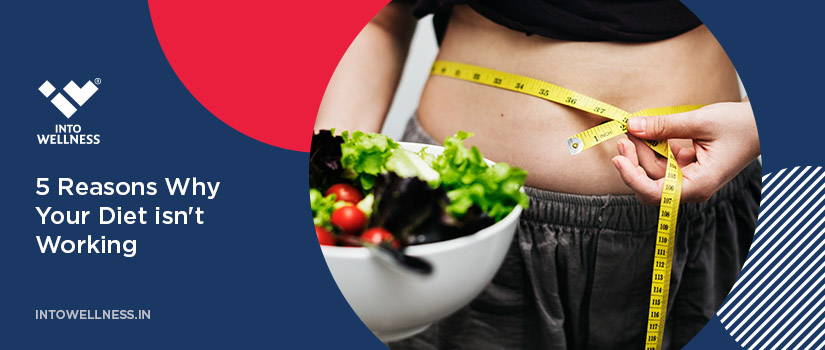
You might be often wondering that you’re doing everything right but your diet isn’t working. But are you unknowingly doing something wrong? Is it your fault for your diet to work? Are you simply meant to be overweight? These are common thoughts and concerns revolving around diet, and weight management. No matter what diet you’re on, the secret to weight loss success is finding the right energy balance for your individual needs. Moreover, it is also important to consider your individual body composition while you’re struggling with a diet.
There are many factors that affect your calorie intake, which can also be the reason for being unable to lose weight. Furthermore, there could also be a combination of several factors. Let’s walk you through each of the following to help you evaluate where you can make adjustments in your routine. However, make sure to consult a registered dietitian or a healthcare professional to determine your individual health needs.
5 Reasons Why Your Diet Might Not be Working
1: Boredom and Hunger Go Hand-in-Hand
Mindless eating happens when we’re bored or when we’re sitting idle watching our favorite show and we need something to bite on. It’s one of the most common reasons we eat even if we’re not hungry, and this is usually psychological which makes us want to eat, even if it’s not required. The solution to this is to find a way out of this, or find another distraction – drinking water first, it will fill your stomach for a while, go for a walk, or indulge in some physical activity. If you find yourself eating too often then your meals might not have the right combination of nutrients to keep you satisfied until the next meal.
Pick foods that are higher in fiber and build meals around protein while you practice regular workouts. Additionally, including a source of healthy fat foods such as olive oil, nuts, or chia seeds, (of course, under the guidance of a nutritionist) also help you to feel full for a longer time.
2: Low-Fat Food Myths
Foods that are high in fat often contain more calories, however, they also provide greater satisfaction when consumed in proper portions. Low-fat foods may sound like a healthier option, but this may lead you to consume the low-fat food in greater quantities than a higher fat option, which can also be disadvantageous for your diet. Be well-aware and conscious of these differences and choose appropriate portions for all foods.
3: Stress and Fatigue
What do you do when your body and mind begin to lag in the afternoon post lunch while in the office or at home? Many of us head to bite on something because it’s natural to look for calories) when you need a quick energy boost.
The problem here is, a snack is not an energy booster if your mind is tired or lagging. A snack might be something your body needs for a boost of energy, but a 15-minute nap or quick break may help you refresh your mind. Here’s what you need to be considerate about while maintaining your diet.
Many of us manage emotions with food, because food provides comfort, often gives us a sense of control and is something we enjoy. But those comfort calories don’t help in terms of maintaining a strict diet.
Check out this webinar we found on YouTube.
Try to tackle the core problem which is fatigue and stress, alter your routine, practice meditation and yoga, reach out to friends and family for emotional support or you can also seek behavioral therapy from a specialist. It is nothing to be ashamed of in today’s modern times. Anything that affects your well-being needs to be addressed.
4: Portion Size with Food Choices
Many of us may not be familiar with portion sizes and what a serving looks like. Any food weighing machine or measuring utensils can be used to keep a check on your intake. You may find yourself eating more than a single serving of many foods, and thus this realization can help you make small adjustments to the quantity that could make a big difference in your caloric intake.
Many people unknowingly consume too many calories from foods that they think are healthy. For example – avocados are healthy fat but they are also naturally calorically dense, so proper portion size is key to maintaining the right diet. Remember, any food that is consumed in excess of your caloric needs will cause weight gain – irrespective of how healthy it is!
5: Non-Exercise Activity Level
After an intense workout or a full-fledged cardio session, if you spend your next few days not exercising at all, then non-exercise activity thermogenesis can account for up to 2000 calories per day. Make sure you’re active all day long, after sufficient rest. Take the stairs, carry your own groceries, walk while you chat on the phone; it’s all helpful to keep yourself moving. Some people shrug inside their beds in case of stress, but try to incorporate easy workouts with a friend to gain support and stay active.
Take-Away
There might be several other reasons that can hamper your diet, such as a sedentary desk job which involves long hours of sitting and least physical activity. Remember, dieting without exercise won’t work. Diet and exercise go hand-in-hand and both need to be given equal importance to reach your fitness goals. Trying to find the reason your diet isn’t working can be annoying but your diet isn’t doomed to fail. One of these factors can be hampering your diet and it’s best to get to the root cause and/or consult a health professional to receive proper guidance. And you can always reach out to friends and family for support and motivation!